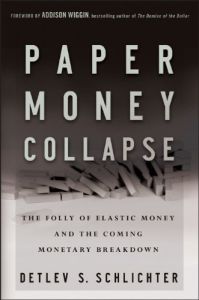The sky is falling, and so are the dollar, the pound and every other currency not linked to an independent, immutable source of value, like gold. So says economist Detlev S. Schlichter, who steps articulately into the middle of the Keynesian-Monetarist divide by inserting Austrian-school economics into the mix. He argues that paper currencies are just devices governments use to rule economies and that money is literally not worth the paper on which it’s printed. It’s a controversial and grim opinion, grimly and artfully delivered. Schlichter is a strong writer who isn’t shy about advocating a radical perspective. Though he’s somewhat given to self-reference and emphatic repetition and – in his passion – even harps a bit on his concerns, getAbstract considers Schlichter’s contrarian take on currency and fiscal policy a highly thought-provoking read for goldbugs or for those who seek alternative views of contentious economic times.
Flexible Money
People take for granted that the pieces of paper in their wallets or the digits they see online in their bank accounts represent their actual money and that the money has value. Yet paper or electronic money without the backing of a material like gold or silver has no intrinsic worth except that which governments and societies assign to it. As a result, governments can adjust an economy’s supply of paper money to suit their own needs; in this sense, money is “elastic.” But gold-backed currency – that is, “commodity money” – retains its value independent of people’s trust or beliefs, and the state cannot manipulate its supply; a nation either has gold or does not.
In modern economies where money and information fly around the world at lightning speeds, the idea of gold-backed currencies seems anachronistic and even impossible. Yet credit cards, paper currency and electronic funds transfers are simply “methods of payment technology” that easily could exist in a commodity-backed money system, just as trade IOUs and banknotes did back when gold anchored most currencies. The fixed, relatively limited supply of gold is adequate to support growing economies...
Detlev S. Schlichter, a writer and Austrian-school economist, formerly worked as a trader and investment manager.










Comment on this summary